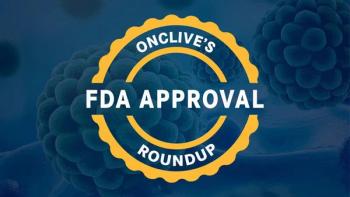
FDA Approves FoundationOne Liquid CDx For New Indications in Advanced Ovarian, Breast, and NSCLC
The FDA has approved the FoundationOne Liquid CDx for use as a companion diagnostic for 3 targeted therapies: alpelisib in advanced or metastatic breast cancer, rucaparib in advanced ovarian cancer, and alectinib in a specific type of metastatic non–small cell lung cancer.
The FDA has approved the FoundationOne Liquid CDx for use as a companion diagnostic for 3 targeted therapies: alpelisib (Piqray) in advanced or metastatic breast cancer, rucaparib (Rubraca) in advanced ovarian cancer, and alectinib (Alecensa) in a specific type of metastatic non–small cell lung cancer (NSCLC).1
The regulatory agency also gave the green light to a label expansion for the diagnostic to report additional select copy number alterations and genomic rearrangements, according to an announcement from Foundation Medicine, Inc.
“FoundationOne Liquid CDx offers oncologists an important and minimally invasive tool to consider when making treatment decisions for their patients, regardless of the type of cancer they have,” Brian Alexander, MD, MPH, chief medical officer at Foundation Medicine, stated in a press release. “These 3 additional companion diagnostic claims expand the test’s clinical utility into breast and ovarian cancer, demonstrating our commitment to bringing precision medicine to more patients, and we plan to continue working with our biopharma partners to increase that reach.”
FoundationOne Liquid CDx is a companion diagnostic that evaluates guideline-recommended genes from a blood sample; the test is capable of evaluating over 300 genes.2 The blood-based biopsy also reports blood tumor mutational burden, microsatellite instability, and tumor fraction values. The goal of the test is to help inform treatment approaches and predict benefit of certain targeted therapies in patients across several cancer indications.
The regulatory approval expands the assay’s indications to include the following targeted treatments:
- Alpelisib, which is approved for use in combination with fulvestrant in the treatment of postmenopausal women and men with hormone receptor–positive, HER2-negative advanced or metastatic breast cancer harboring a PIK3CA mutation following progression on or after an endocrine-based regimen.
- Rucaparib, which is indicated for adult patients with deleterious BRCA mutation–associated epithelial ovarian, fallopian tube, or primary peritoneal cancer who previously received 2 or more lines of chemotherapy.
- Alectinib, which is approved for use in patients with metastatic NSCLC harboring an ALK mutation, as detected by an FDA-approved test.
Previously, in August 2020, the
References
- FDA approves New FoundationOne Liquid CDx companion diagnostic indications for three targeted therapies that treat advanced ovarian, breast, and non–small lung cancer. News release. Foundation Medicine, Inc. October 27, 2020. Accessed October 27, 2020.
https://bit.ly/37PfW2D . - FoundationOne Liquid CDx. Foundation Medicine, Inc. Accessed October 27, 2020.
https://bit.ly/3oxjw7G . - FDA approves FoundationOne Liquid CDx to serve as Rubraca (rucaparib) companion diagnostic to identify eligible patients with BRCA1/2-mutant, metastatic castration-resistant prostate cancer (mCRPC). News release. Clovis Oncology, Inc. August 26, 2020. Accessed October 27, 2020.
https://bwnews.pr/2EEVIMm . - FDA approves Foundation Medicine’s FoundationOne Liquid CDx, a comprehensive pan-tumor liquid biopsy test with multiple companion diagnostic indications for patients with advanced cancer. News release. Foundation Medicine. August 26, 2020. Accessed October 27, 2020.
https://bit.ly/2EtxNQs .


































